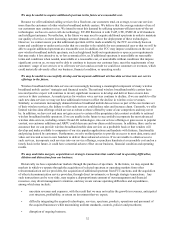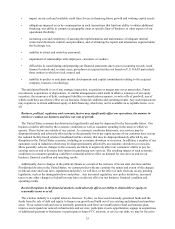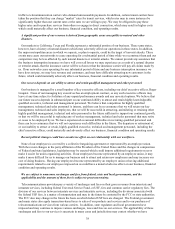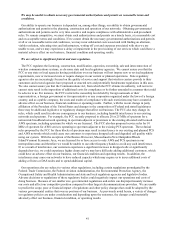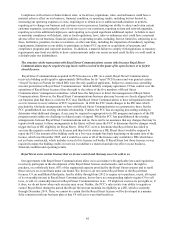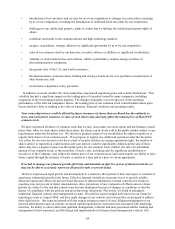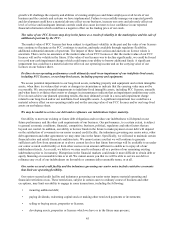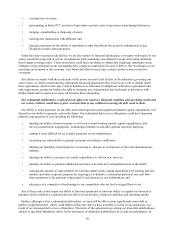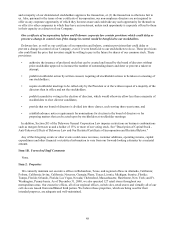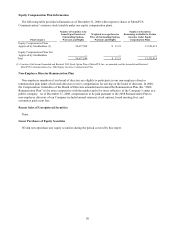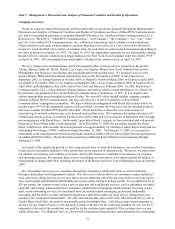Metro PCS 2008 Annual Report Download - page 51
Download and view the complete annual report
Please find page 51 of the 2008 Metro PCS annual report below. You can navigate through the pages in the report by either clicking on the pages listed below, or by using the keyword search tool below to find specific information within the annual report.42
Compliance with current or future federal, state, or local laws, regulations, rules, and ordinances could have a
material adverse effect on our business, financial condition, or operating results, including but not limited to,
increasing our operating expenses or costs, requiring us to obtain new or additional authorizations or permits,
requiring us to change our business and customer service processes, limiting our ability to attract and retain certain
customer segments, increasing the costs of our services to our customers, requiring system and network upgrades,
requiring us to hire additional employees, and requiring us to spend significant additional capital. A failure to meet
or maintain compliance with federal, state or local regulations, laws, rules or ordinances also could have a material
adverse effect on our business, financial condition, or operating results, including, but not limited to, subjecting us to
fines, forfeitures, penalties, license revocations, or other sanctions, including the imposition of mandatory reporting
requirements, limitation on our ability to participate in future FCC auctions or acquisitions of spectrum, and
compliance programs and corporate monitors. In addition, a material failure to comply with regulations or statutory
requirements may limit our ability to draw certain amounts under our senior secured credit facility or could result in
a default under our indebtedness.
The structure of the transaction with Royal Street Communications creates risks because Royal Street
Communications may be required to pay back credits received in the grant of its open licenses or to forfeit
closed licenses.
Royal Street Communications acquired its PCS licenses as a DE. As a result, Royal Street Communications
received a bidding credit equal to approximately $94 million for its “open” PCS licenses and was granted certain
“closed” licenses in Florida for which DEs were the only qualified applicants. Subject to certain non-controlling
investor protections in Royal Street Communications’ limited liability company agreement, C9 has control over the
operations of Royal Street because it has the right to elect three of the five members of Royal Street
Communications’ management committee, which have the full power to direct the management of Royal Street
Communications. However, the Royal Street Communications business plan may become so closely aligned with
our business plan that there is a risk the FCC may find Royal Street Communications to have relinquished control
over its licenses to us in violation of FCC requirements. In 2006 the FCC made changes to the DE rules which
preclude the wholesale arrangements we have with Royal Street Communications on a prospective basis, but the
FCC grandfathered our existing wholesale relationship. Further, the FCC has an ongoing proceeding seeking to
determine what additional changes, if any, may be required or appropriate to its DE program and aspects of the DE
program remain subject to challenge in federal courts of appeal. While the FCC has grandfathered the existing
arrangements between Royal Street Communications and us, there can be no assurance that any changes that may be
required with respect to those arrangements in the future will not cause the FCC to determine that the changes would
trigger the loss of DE eligibility for Royal Street. If the FCC were to determine that Royal Street has failed to
exercise the requisite control over its licenses and thus lost its status as a DE, Royal Street would be required to
repay the FCC the amount of the bidding credit on a five-year straight-line basis beginning on the grant date of the
license, which was December 2005, and it could lose some or all of the licenses only available to DEs which have
not yet been constructed, which includes several of its licenses in Florida. If Royal Street lost those licenses or was
required to repay the bidding credits it received, it could have a material and adverse effect on our business,
financial condition and operating results.
Royal Street owns certain licenses that we do not control and that may never be sold to us.
Our agreements with Royal Street Communications allow us in accordance with applicable laws and regulations
to actively participate in the development of the Royal Street licenses and networks, and we have the right to
purchase, on a wholesale basis, 85% of the engineered capacity provided by the Royal Street systems and to resell
those services on a retail basis under our brand. We, however, do not control Royal Street or the Royal Street
licenses. C9, an unaffiliated third party, has the ability through June 2012 to require us to purchase, or put, all or part
of its ownership interest in Royal Street Communications, but we have no corresponding right to require C9 to sell
to us, or call, its ownership interest in Royal Street Communications to us. C9 might not exercise its put rights or, if
it does, we do not know when such exercise may occur. Further, the FCC’s rules restrict our ability to acquire or
control Royal Street during the period that Royal Street must maintain its eligibility as a DE, which is currently
through December 2010. Thus, we cannot be certain that the Royal Street licenses will be developed in a manner
fully consistent with our business plan or that C9 will act in ways that benefit us.


